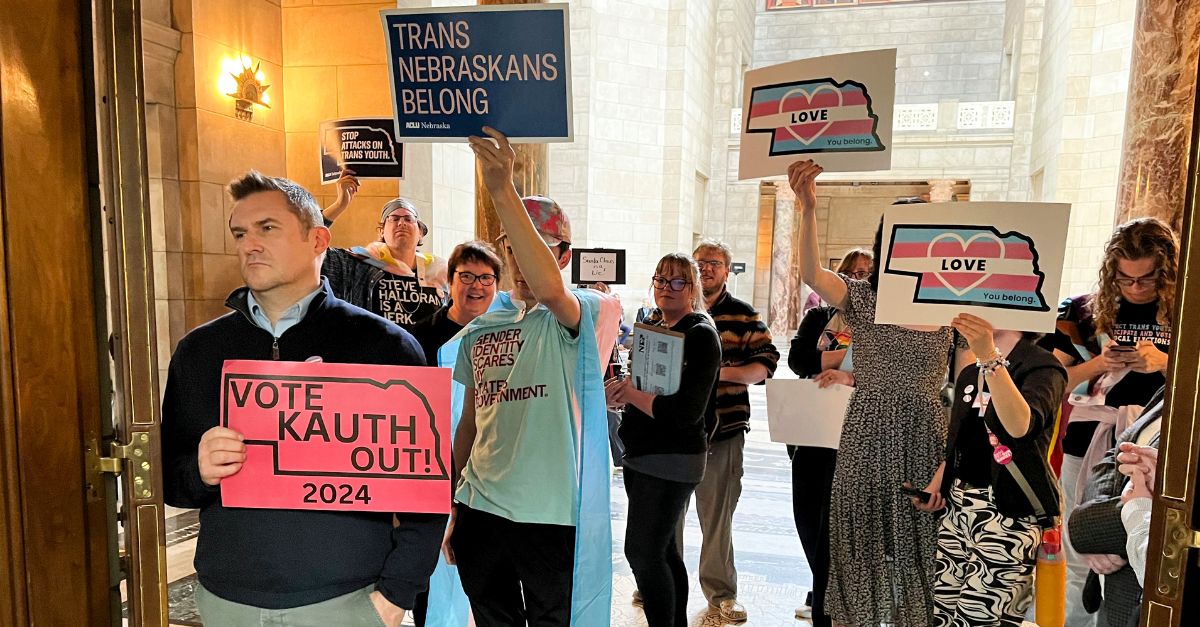
Protesters hold signs outside the doors of the legislative chamber in the Nebraska Capitol in response to a bill that would have restricted students to bathrooms, locker rooms and sports teams that correspond with the gender they were assigned at birth, April 5, 2024, in Lincoln, Neb. (AP Photo/Margery Beck, File)
A split panel of a federal appeals court ruled Friday to block the Biden administration from enforcing its efforts to protect gay and transgender students’ access to bathrooms and sports teams in 20 states. The court reasoned that the federal government failed to follow proper procedure before issuing a group of documents instructing public schools that sex-based discrimination extends to discrimination based on sexual orientation and gender identity.
After the U.S. Supreme Court ruled in Bostock v. Clayton County in 2020 that civil rights protections for “sex” extend to sexual orientation and transgender status, the Biden administration Education Department and Equal Employment Opportunity Commission issued a “Dear Educator” letter in 2021, a “notice of interpretation” and a fact sheet meant to give interpretive guidance. The administration said in the documents that the Bostock ruling protects the rights of transgender people to have access to bathrooms, locker rooms, and sports teams under Title VII and Title IX in schools and workplaces.
Accordingly, education programs that receive federal funding were instructed to fully enforce Title IX to prohibit discrimination on the basis of sexual orientation and gender identity.
Twenty states, most of them represented by Republican attorneys general, sued the Department of Education (DOE) seeking to invalidate the administration’s guidance. The plaintiff states are Alabama, Alaska, Arizona, Arkansas, Georgia, Idaho, Indiana, Kansas, Kentucky, Louisiana, Mississippi, Missouri, Montana, Nebraska, Ohio, Oklahoma, South Carolina, South Dakota, Tennessee, and West Virginia.
A panel of the U.S. Court of Appeals for the Sixth Circuit that included Donald Trump appointees Joan Larsen and John Nalbandian ruled that the plaintiff states were entitled to a preliminary injunction against the DOE’s guidance, because they were likely to succeed at proving a procedural defect in the department’s guidance.
Nalbandian wrote for the majority and characterized the Biden administration’s interpretation of the Bostock ruling “basically, the opposite take” from the Trump administration’s.
The judge said in his opinion that the administration’s “novel” policy reflected in the documents conflicted with policies that the plaintiff states had in place, thereby supporting the states’ right to bring a lawsuit. Nalbandian wrote that the states alleged cognizable injury in that their own sovereignty was threatened via the contradictory instructions from the federal government.
Further, Nalbandian said that the DOE violated the federal Administrative Procedure Act by handing down what was “tantamount to a legislative rule” without first going through a public notice and comment procedure.
In dissent, U.S. Circuit Judge Danny Julian Boggs, a Ronald Reagan appointee, disagreed with the majority’s foundational premises.
“In my view, the … Documents … are interpretive rules or policy statements,” wrote Boggs.
“Legislative rules impose new rights or obligations on regulated parties, while interpretive rules ‘articulate what an agency thinks a statute means,”” the judge explained.
Boggs also slammed the majority for failing to even address the heart of the dispute: the question of whether discrimination “on the basis of sex” includes discrimination based on gender identity or transgender status.
Boggs noted that it is “fairly easy” to imagine the legal question that will arise:
To be blunt, the issue that will need to be decided at some point in other venues and litigation is whether it is “discrimination” to treat people who have XY chromosomes, who have a penis or once had a penis, or who can or once could produce sperm, just the same as one treats all others in those categories, or whether it is instead “discrimination” to treat the very same people the same way, or to refuse to treat the very same people differently, if they choose to declare or present at some point along the possible continuum laid out above.
The judge characterized the DOE’s guidance as just that: tools to create understanding, not those that create new and additional legal obligations.
“Put simply, the Documents explain legal obligations; they do not create them,” Boggs wrote.
You can read the court’s full ruling here.
Have a tip we should know? [email protected]









